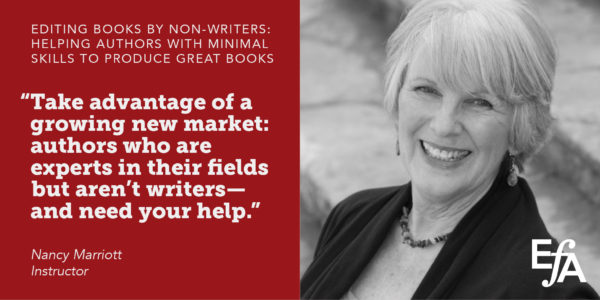Description

Learn how to work with authors who are not writers (business people, doctors, health practitioners, personal growth leaders, memoirists, etc.) and are undertaking lengthy, full-length, nonfiction book projects. These are clients who have never taken a writing course (other than English 101 in college—maybe!) and usually can’t even point to books on their topic or in their genre that they’ve read and liked. Many need to be educated to understand the editing process and services needed/offered. They may think their ms. needs a proofing when it really needs a developmental pass. Many are using a language specific to their business/specialty, such as the “medical-ese” of doctors, and may need help breaking that mold, or they are English as a Second Language writers and their writing is rough in translation due to their limited skills. Others (memoirists, especially) need to be educated on the difference between “writing” as in simply recounting memories, and “writing” as it appears in published books, a difference not easy for the non-writer to distinguish.
One challenge is to evaluate how much developmental feedback they can understand and implement. For example, employing the technique of “show don’t tell” isn’t easy for a non-writer, so if suggested may be too difficult for them to do. You need to assess how much you will need to implement vs. the author, and charge accordingly, asking for more $$, as the job requires more rounds.
The class also covers lessons that editors need to know:
- When to send a client back to the drawing board (or to go take a writing course)
- how to avoid getting caught up in judging “poor writing,” but look for the gem in their message and help them deliver it in their own voice
- how to stand up for your own expertise vs. theirs
- how to unpack and explain various editing tools (tracked changes) so clients can see your work you’ve done and accept or reject it
- how to structure a book from blogs or collected writings, which may be all the author has
- and more!
Students will also have access to the instructor’s Editorial Flow Chart. This is a tool for use at the outset of the project with milestone dates for the stages leading to completion. The Chart gives a reference for both editor and author to judge and schedule their time, something non-writers may have difficulty doing.
“Self-paced” means that students read the lessons and do the exercises at their own pace. There is no instructor feedback. You will have six months to access the course materials, which can be downloaded for your future reference.
Registrations will be taken until January 6, 2020, at which time the class will be closed to new enrollment.
Course designer Nancy Marriott has been helping authors reach their writing and publishing goals for almost 25 years as a free-lance book editor, co-author, and coach. Her background includes a BA in English from the University of Massachusetts and an MA in English from Columbia University, as well as a TESOL certificate in English as a Second Language. More recently, she was an instructor in ESL at Santa Barbara City College for two decades, and currently is cofounder of Editorial Arts Academy, a live/online community for training and support of freelance book editors. Through the Academy, Nancy has led several classes, one-day workshops, and mentorship groups. Past clients include Dr. Candace Pert, Dr. Kelly Brogan, and Rhys Thomas. She currently lives in Montpelier, Vermont, with her husband Richard and, when not editing or supporting other editors, can be found playing with her three-year-old twin grandchildren.
Our online courses are conducted through Sakai, a learning management system (LMS). Self-paced courses are undertaken by the student at their own pace and no instructor feedback is provided. Students will have six months to access the course site and may download the course materials for later review. Information on how to access the course will be provided one to two business days after registration. All participants in EFA courses must abide by our anti-harassment policy, which you can find here.


